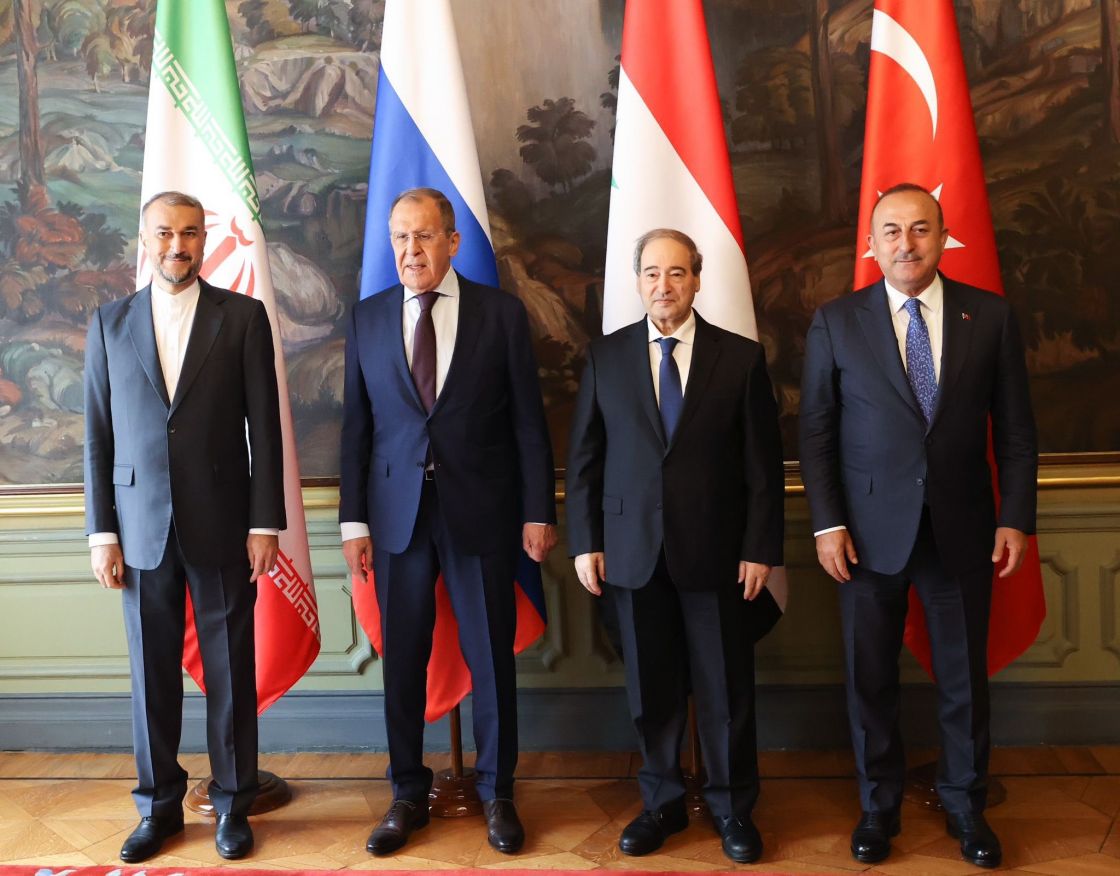- Editorials
- Posted
Kassioun Editorial 1122: What After the Foreign Ministers’ Meeting?
Last Wednesday, May 10, the quadripartite meeting of the foreign ministers of Syria, Turkey, Russia, and Iran was held in Moscow, after a series of meetings at lower levels.
Among the meeting’s results announced by the Russian side is the joint Syrian-Turkish preparation for a roadmap to settle relations between the two sides, with continuous mediation and assistance by Russia and Iran. The roadmap takes into account the various outstanding issues, including the military, security, and political aspects. This will be complemented by a meeting between the Syrian and Turkish presidents, which at that time will represent the starting point for implementing what has been agreed upon and what will be agreed upon on the various issues, including a comprehensive political solution to the Syrian crisis.
Among the most important clear and consistent trends at this stage, with regard to how the Syrian crisis is being dealt with regionally and internationally, are the following:
First: The Astana track is continuously and relentlessly advancing along the path to resolving the Syrian crisis, and it is completing moving up from the level of military cooperation whose function is to achieve a ceasefire, to political cooperation whose function is to achieve stability through a political solution.
Second: Among the main functions the Astana track seeks to execute is breaking the Western blockade and sanctions completely and finally, not by pleading with the West as some do, but rather by securing tangible alternatives that make these sanctions meaningless. The main key in that is the Syrian-Turkish settlement, which secures for Syria a wide outlet towards Russia, Iran, and China.
Third: The official Arab position, in the context of the ongoing transformations on the international scene, is witnessing an important gradual shift, the overall outcome of which is not in the American-Western interest with regard to Syria. This does not negate the fact that some Arab countries that have normalized with the Zionist entity are seeking to secure a back door for the West into Syria, which would hinder the solution and push for actual partition, if they were able to do so. Nevertheless, the overall outcome does not lie with those, and the rise in cooperation among Saudi Arabia, Russia, and China in a large number of regional and international issues, in addition to the recent improvement of Saudi Arabia’s relationship with both Iran and Turkey, makes it possible to predict that cooperation and coordination regarding Syria is possible and achievable, and may even have really moved steps forward, steps that might not have been announced yet.
Syria’s external settlements and agreements are an essential tool in achieving stability, and their effect cannot be complete without a comprehensive political solution in accordance with UNSC Resolution 2254. This itself is part of Syria’s general roadmap towards the future, not only within its external relations, but also and primarily in internally.
This roadmap requires direct negotiation between the regime and the opposition, and Damascus is the most appropriate place for such negotiation, with the necessary guarantees being provided, of course. If the regime is distinctly one of the negotiating sides, then the other side, i.e., the opposition, should also be distinct and founded on criteria that serve to reach a patriotic solution.
Those extremists who have worked for years against a political solution will continue to work against it and try to obstruct it, which requires neutralizing and isolating them, especially those who worked against the Astana process, against the Syrian-Turkish settlement, and against settling Arab relations with Syria.
That form and those structures of the opposition that were designed based on external intervention, and based on Western aid and “advice”, are neither qualified nor appropriate to enter into any negotiation, let alone reach Syrian patriotic solutions.
The overall outcome of the various forces surrounding and intervening in Syria opens a wide scope for Syrians to determine their own destiny, and this is what must be utilized to the maximum, and within the objective time limits for that. This is because the reality of the deteriorating situation inside the country and among refugees in neighboring countries is that Syria and the Syrians are in a race against time, between death and life.


